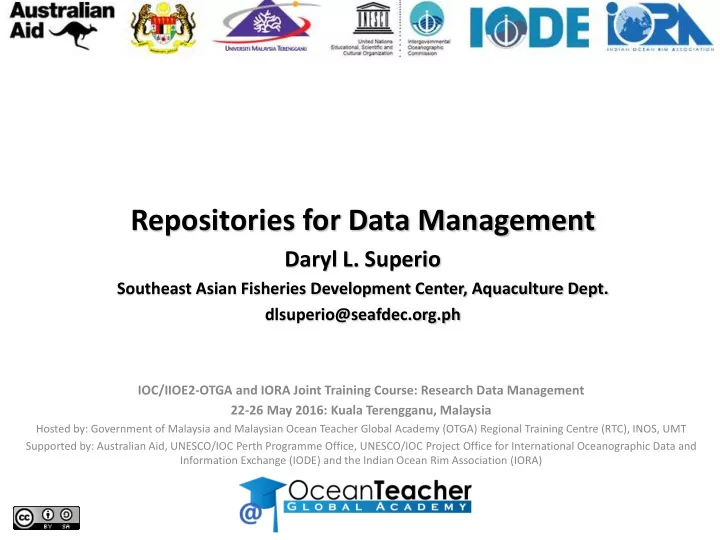

Repositories for Data Management Daryl L. Superio Southeast Asian Fisheries Development Center, Aquaculture Dept. dlsuperio@seafdec.org.ph IOC/IIOE2-OTGA and IORA Joint Training Course: Research Data Management 22-26 May 2016: Kuala Terengganu, Malaysia Hosted by: Government of Malaysia and Malaysian Ocean Teacher Global Academy (OTGA) Regional Training Centre (RTC), INOS, UMT Supported by: Australian Aid, UNESCO/IOC Perth Programme Office, UNESCO/IOC Project Office for International Oceanographic Data and Information Exchange (IODE) and the Indian Ocean Rim Association (IORA)
Learning Outcomes • At the end of the session you will: – gain knowledge about, and understand the value of data repositories – identify the different types of repositories for data management – learn how to evaluate data repositories
Institutional Repositories (IRs) Defined • are electronic systems that capture, preserves, and provide access to the digital work products of a community (Foster & Gibbons, 2005) • are online archives that collect, preserve, and disseminate the intellectual output of an institution’s communities (faculty, students, staff, and alumni) and historical materials produced by the institution (Gibney, 2015)
Purposes of IRs Rieger (2015) • Enable digital asset management • Offer preservation services • Provide institutional visibility through access to collective intellectual work • Support learning, teaching, and research • Facilitate discovery of content • Enable re-use and re-purposing of content
Purposes of IRs Rieger (2015) • Support archival business requirements • Offer alternative channels in support of scholarly communication • Organize information to allow effective content management and access • Provide access to outcomes of publicly funded research initiatives • Strengthen partnership between content creators/providers and content managers
Contents • Articles • Books • Book chapters • Conference proceedings, presentations, lectures • Photographs • Videos • Voice recordings • Data
Different IR Software
IRs in IORA
PPDNSZ Repository http://dspace.psnz.umt.edu.my/xmlui/
Data Repositories (DRs) Defined E-Science Thesaurus (2016) http://esciencelibrary.umassmed.edu/professional-educ/escience-thesaurus/data-repository • a place that holds data, makes data available to use, and organizes data in a logical manner • appropriate, subject-specific location where researchers can submit their data
Types of DRs 1. Institutional DRs – maybe disciplinary or multidisciplinary – usually found in academic, research, and government institutions – maintained to preserve and make available their academic or research works – benefits (University of Queensland Library, 2016): • repositories are backed by institutions • different types of datasets can be stored together, regardless of discipline • institutions generally guarantee support • data can link to publications related to the data • but not all research institutions have central data repositories
Types of DRs 2. Domain/Scientific DRs – specific data archives – serve a scientific community, which may be a traditional academic discipline, a subdiscipline, or an interdisciplinary network of scientists, united by a common focus (Ember, 2013) – benefits (University of Queensland Library, 2016): • your data will be stored with similar data • researchers will find your data easily • repository staff understand your kind of data • the repository may offer computational tools to crunch or visualise your data • but repositories may close down if funding ends
Institutional DRs https://data.csiro.au/dap/home?execution=e2s1 http://nsuworks.nova.edu/ https://purr.purdue.edu/ http://datashare.is.ed.ac.uk/
CSIRO Data Access Portal https://data.csiro.au/dap/browse
Domain/Scientific DRs http://www.ncbi.nlm.nih.gov/genbank/ http://badc.nerc.ac.uk/home/index.html https://figshare.com/ https://www.pangaea.de/ http://www.seanoe.org/ http://datadryad.org/
DRYAD http://datadryad.org/resource/doi:10.5061/dryad.sp418
Why Share/Archive Research Data? • funding agency requirement • publisher’s requirement • data organization • data discovery/data reuse • enables collaboration across scientific community • long-term preservation
How to Identify Repository for your Data? • Publisher’s recommendations/specifications
How to Identify Repository for your Data? • Registry of Research Data Repositories http://www.re3data.org/ • Biosharing https://biosharing.org
Guidelines on Evaluating DRs for Publishing Research Data Callaghan et al. (2014) • enable access to the dataset • ensure dataset persistence • ensure dataset stability • enable searching and retrieval of datasets • collect information about repository statistics
References Callaghan, S., Tedds, J., Kunze, J., Khodiyar, V., Lawrence, R., Mayernik, M. S., ... & • Whyte, A. (2014). Guidelines on recommending data repositories as partners in publishing research data. International Journal of Digital Curation , 9 (1), 152-163. Ember, C., Hanisch, R., Alter, G., Berman, H., Hedstrom, M., & Vardigan, M. (2013). • Sustaining domain repositories for digital data: a white paper . Retrieved 07 May 2016 from http://datacommunity.icpsr.umich.edu/sites/default/files/WhitePaper_ICPSR_SDRDD_121113.pdf Foster, N. F., & Gibbons, S. (2005). Understanding Faculty to Improve Content • Recruitment for Institutional Repositories. D-Lib Magazine , 11 (1). Retrieved 07 May 2016 from http://www.dlib.org/dlib/january05/foster/01foster.html Gibney, M. (2015). Institutional repositories for data management . Retrieved 07 May • 2016 from http://classroom.oceanteacher.org/mod/resource/view.php?id=5678 Rieger, O. Y. (2007). Select for success: Key principles in assessing repository • models. D-lib Magazine , 13 (7/8). The University of Queensland. (2016). Research data management: Repositories. • Retrieved 07 May 2016 from http://guides.library.uq.edu.au/research-data- management/repositories https://data.csiro.au/dap/browse • http://datadryad.org/resource/doi:10.5061/dryad.sp418 • http://dspace.psnz.umt.edu.my/xmlui/ • http://esciencelibrary.umassmed.edu/professional-educ/escience-thesaurus/data- • repository
Thank you!
Recommend
More recommend